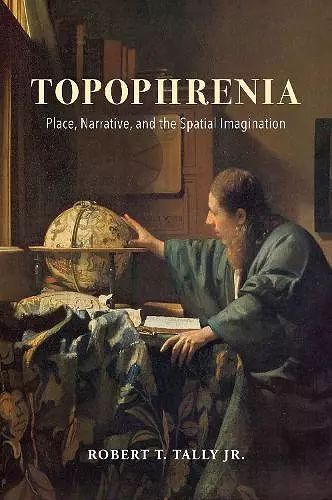Topophrenia
Place, Narrative, and the Spatial Imagination
Format:Hardback
Publisher:Indiana University Press
Published:9th Nov '18
Currently unavailable, and unfortunately no date known when it will be back
This hardback is available in another edition too:
- Paperback£23.99(9780253037664)

What is our place in the world, and how do we inhabit, understand, and represent this place to others? Topophrenia gathers essays by Robert Tally that explore the relationship between space, place, and mapping, on the one hand, and literary criticism, history, and theory on the other. The book provides an introduction to spatial literary studies, exploring in detail the theory and practice of geocriticism, literary cartography, and the spatial humanities more generally. The spatial anxiety of disorientation and the need to know one's location, even if only subconsciously, is a deeply felt and shared human experience. Building on Yi Fu Tuan's "topophilia" (or love of place), Tally instead considers the notion of "topophrenia" as a simultaneous sense of place-consciousness coupled with a feeling of disorder, anxiety, and "dis-ease." He argues that no effective geography could be complete without also incorporating an awareness of the lonely, loathsome, or frightening spaces that condition our understanding of that space. Tally considers the tension between the objective ordering of a space and the subjective ways in which narrative worlds are constructed. Narrative maps present a way of understanding that seems realistic but is completely figurative. So how can these maps be used to not only understand the real world but also to put up an alternative vision of what that world might otherwise be? From Tolkien to Cervantes, Borges to More, Topophrenia provides a clear and compelling explanation of how geocriticism, the spatial humanities, and literary cartography help us to narrate, represent, and understand our place in a constantly changing world.
"Tally writes tersely and elegantly of the Odyssey, The Divine Comedy, of Moby-Dick (notably 'The Chart' sequence), Ulysses, Tolkein's 'middle worlds,' and, soon after, Thomas More and of the relation of utopia to fantasy and science fiction. If space belongs to the form and purpose of the novel, it also applies to Topophrenia in general. ... Ambitious in scope, the strength of Topophrenia is found in how it makes its case."—Peta Mitchell, author (with Jane Stadler and Stephen Carleton) of Imagined Landscapes: Geovisualizing Australian Spatial Narratives
"With Topophrenia Robert Tally discerns, first, how literature invents and produces space, and second, what the creative imagination does with space. These become the ground of a critical praxis addressing the conditions of the world in which we live. Blending close analysis with dialectics, Tally's book is a compelling study of the complex relations of literature and geography."—Tom Conley, author of An Errant Eye: Poetry and Topography in Early Modern France
ISBN: 9780253037701
Dimensions: unknown
Weight: unknown
210 pages